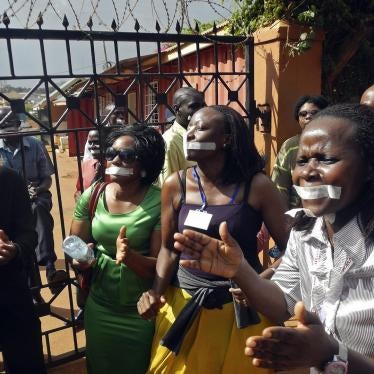Government harassment and discriminatory legislation are suppressing independent political activity in Uganda.
"Uganda has become the darling of the Western powers," said Peter Bouckaert, author of the report and Uganda researcher for Human Rights Watch. "But Uganda is moving away from democracy, not towards it. The ‘movement' political system is inherently hostile to democratic freedoms."
The report, entitled "Hostile to Democracy: The Movement System and Political Repression in Uganda," charges that Museveni's NRM has outlawed most activities of political parties, including holding meetings and public rallies and sponsoring candidates for election.
At the same time, the report recognizes that Uganda had made significant progress in many areas of human rights. Although police and army abuses persist, the NRM has forged an army which is more disciplined than its predecessors. Uganda has also established a credible Human Rights Commission. But the progressive policies pursued by the Ugandan government in some areas of human rights protection contrast sharply with its policies in the political arena.
"Uganda has ended the massive slaughter of civilians which characterized the regimes of Idi Amin and Milton Obote," said Bouckaert. "The ruling party should not jeopardize these accomplishments by refusing to compete for votes in a free and open system."
Since 1986, independent political parties in Uganda have been legally prohibited from carrying out many basic political activities. Political activists who attempt to hold public events are frequently harassed and arrested by police, and Human Rights Watch has documented many cases where police officials broke up rallies and seminars, occasionally through violent means. Civil society groups are required to be nonpolitical or face similar harassment.
"All kinds of groups, not just political parties, have been targeted for engaging in activities that displease the NRM government," said Bouckaert. "The ban on political activities is very broadly enforced to stop any perceived threat to the NRM."
The NRM, now renamed "the movement," presides over what it calls a "No-Party" system, but is itself virtually indistinguishable from a state-funded political party. The NRM has consolidated its monopoly on political power through exclusive access to state funding and machinery, widespread and sometimes compulsory political education programs, and an exemption from the stringent constraints placed on opposition political parties.
Human Rights Watch expressed concern about the June 2000 referendum on Uganda's future political system, questioning whether a "free and fair" referendum could take place in Uganda in the restricted political climate, and stating that fundamental human rights such as freedom of association, assembly, and expression could not be surrendered by majority mandate.
"The very purpose of human rights is to put certain fundamental standards beyond the whims of the majority, and to protect the rights of minorities," said Bouckaert. "Uganda's proposed referendum would put fundamental human rights up for a vote and that is unacceptable. Besides, the NRM has been unwilling to allow the advocates of pluralism to put their case to the voters."
The rights organization urged Uganda to bring the country's national legislation on the rights of political parties into line with international standards. The international community should step up its dialogue with the Ugandan authorities to ensure respect for democratic freedoms in the country.





